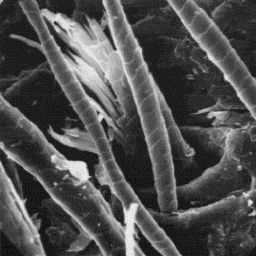 Ovis aries - Persian lamb skin
Ovis aries - Persian lamb skin
------------------------------
English: Sheep
German: Hausschaf
French: Mouton
Spanish: Ovejas
The sheep is one of the oldest domes-
ticated animals and, today, many varieties
are bred in all the inhabited continents.
The species can be classified into three
groups according to the wool quality: the
fine wool type, the semi-fine wool type and
the coarse wool type. Zoologically, the
sheep could be classified into four groups.
In the first group are the fatty-tailed The surface structure
sheep, yielding high quality Persian furs, of the skin, 400x
for example Kara-kul, Balcanian, Moldavian,
Bagdad type and others. In the second group are the wide- backed sheep, with
semi-Persian wool, for example, the Astrakhan, Tibetian, Indian, Pakistan and
Afghanistan breeds. The third group covers the short-tailed breeds with coarse
wool. These sheep are the older and, today industrially less important types
and, for fur purposes, only lamb skins are used. The last group are the
thin-tailed sheep, with a fine wool coat, which are the most important in the
wool industry. The main representatives of this group are the merino species
and similar fine wool-coated types.
|
|
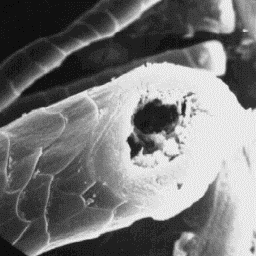 Ovis aries - Persian lamb skin
Ovis aries - Persian lamb skin
------------------------------
English: Sheep
German: Hausschaf
French: Mouton
Spanish: Ovejas
Distribution areas
------------------
The Persian furs are obtained from
stillborn lambs bred in Iran and other
Middle and South Asian Countries. This
sheep species is known as the Kara-kul type
and originates in Buchara. Today this
variety is bred in a number of other
countries. The skins from South-West Africa Transverse section
are named Swacara. of an intermediate fibre, 1000x
Description of the fur
----------------------
The skins are from 30 to 80 cm long. The wool coat is black or dark-brown
in colour but different colour mutations are known. The hair fibres are
rolled into whirls with the hair tips turned in towards the coat. The whirls
are tubelike or ring-like in shape and the bundles are lustrous. The
undercoat layer cannot be distinguished.
|
|
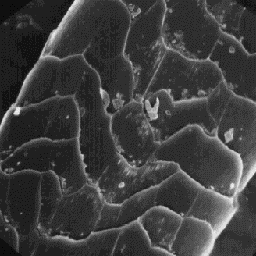 Ovis aries - Persian lamb skin
Ovis aries - Persian lamb skin
------------------------------
English: Sheep
German: Hausschaf
French: Mouton
Spanish: Ovejas
Structure of the hair
---------------------
The microscopic structure of the skin
surface is furrowed. The hair follicles
have narrow upper parts and straight edges.
The average follicle contains only one hair
shaft.
The fine fur fibres are scarce and the The cuticular structure
diameter is from 8 to 15 µm. The of an intermediate hair, 1000x
cross-section is circular and the cuticular
scales are cornet-like with smooth surfaces and straight scale margins. These
fine fibres are non-medullated.
|
|
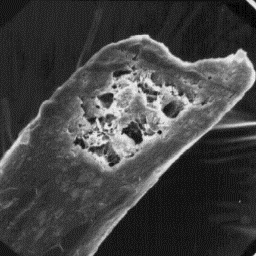 Ovis aries - Persian lamb skin
Ovis aries - Persian lamb skin
------------------------------
English: Sheep
German: Hausschaf
French: Mouton
Spanish: Ovejas
The intermediate fibres and the guard
hairs form one group; the coat mostly
consists of uniformly shaped fibres with a
diameter of 40 to 80 µm. The cross-section
is circular, or ellipsoidal in the upper
part of the shaft, and the cuticular scales
belong to the even tile-like type with
either a smooth scale surface or, mainly in
the upper parts of the shaft, a non-regular Transverse section
grooved surface. The scale margins are of a guard hair, 600x
straight. The medulla is narrow at the
bottom of the shaft but, at the top, the medullar column is wide. The medulla
is unbroken longitudinally, symmetrical in cross-section and situated in the
central axial part of the shaft. The overall structure of the medulla belongs
to the non-regular type with a fibrous or amorphous infilling substance.
|
|
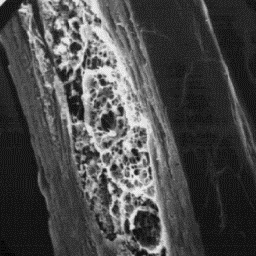 Ovis aries - Persian lamb skin
Ovis aries - Persian lamb skin
------------------------------
English: Sheep
German: Hausschaf
French: Mouton
Spanish: Ovejas
Longitudinal section
of a guard hair, 1000x
Numerical code for Persian lamb skin structure
----------------------------------------------
Surface of the skin: 3-4-1
Fine fur fibres: 1-5-1-1-4-0-0-0-0-8.15-5.21
Intermediate fibres: 2.1-2-1.3-1-3.2-1-1-16-7.8-40.61-15.35
Guard hairs: 2.1-2-1.3-1-3.2-1-1-16-7.8-60.81-20.51
|




